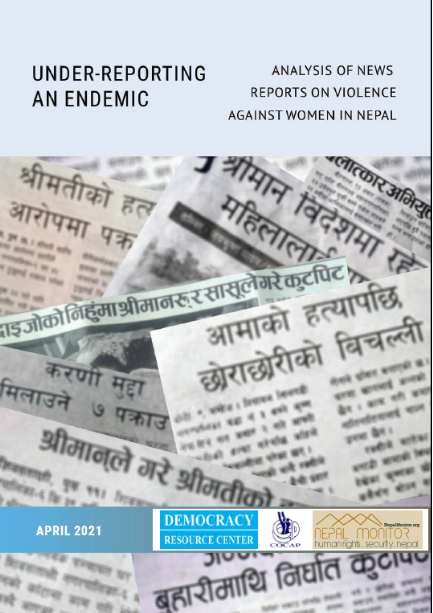Incident Reports
The fear factor: Some are absurdly terrified that fairer laws will lead to an influx of immigrants
2019-03-08
Nepal
Some lawmakers from the Nepal Communist Party, the Nepali Congress and the Majdoor Kisaan Party are doubtful whether they can truly believe a mother's declaration on who the father of the child is. Jhapat Rawal, a lawmaker from the ruling party was of the view that should mothers be allowed to transfer citizenship to their children without having to disclose who the father of the child is, it will lead the society towards chaos. A bunch of lawmakers belonging to different political parties were quick to second his thought.
On Thursday, the parliamentary State Affairs Committee deliberated whether a child of a female Nepali citizen should be allowed to obtain Nepali citizenship by descent if the applicant can explain convincingly that the father's identity is unknown.
Critics of the law enabling Nepali women to pass citizenship to their children argue that easing provisions will lead to a flurry of foreign nationals gaining Nepali citizenship and threaten Nepal’s sovereignty and security. According to the 2011 census, 893,800 children live with single mothers.
But their argument is flawed and outdated, and their fears of being swamped by immigrants, misplaced. This citizenship debate seems to reflect the institutionalised misogyny of our political class. It is also a striking example of how ideas pertaining to the social and legal status of women mirror the nationalist fears of various political actors. But what they do not understand is that our sovereignty is not so fragile, and they should not perceive Nepali women as security threats. What’s more, the debate points to fault lines in Nepal’s quest for inclusive democracy.
The amendment tweaked the phrase 'provide proof of the father’s identity being unknown' to 'provide an explanation'. Quite evidently, these are merely superficial changes in the language. Women’s rights activists have rightly argued that this does not really mean anything. Technically, a child born to a female Nepali citizen can obtain citizenship in the mother’s name. But the law has several conditions that make it impossible to get citizenship in the mother’s name, they argue. For instance, a child born to a female Nepali citizen married to a foreign citizen in Nepal may be granted naturalised citizenship, but only after producing proof that the child has not acquired the citizenship of the father’s nation. These conditions do not exist for a child born to a male Nepali citizen married to a foreign national.
Time and again, women’s bodies have been treated simply as machines for the reproduction of potential citizens--subject to control by the state. In this case, by casting all women as potential conspirators in a scheme to overwhelm Nepal with foreign nationals, nationalist fears of the status quo are especially gendered. But women are as much a state’s citizens as men. Political leaders make grandiose claims about gender inclusivity and gender equity, but the same parties that advocate for a progressive society are quick to break their commitment to women’s citizenship rights in the name of political expediency.
Citizenship should not be about a mere status and rights. It should be inclusive, and it should promote participation and agency. Clearly, state-level fears are not helping to make this happen. The discriminatory citizenship clause should be a national issue, not just a gender issue. And the political class, especially its men, need to rethink their deep-rooted xenophobia and patriarchal mindset. If we are to lay the foundation for a fairer society, mothers passing citizenship to their children without precondition should be a non-issue.
Related Reports
GBV / Siraha
Complaint lodged against a 30-year-old man on the charge of raping a 13-year-old teenage girl in Siraha
GBV / Okhaldhunga
52-year-old man arrested on the charge of sexually assaulting a 16-year-old teen girl in Okhaldhunga
GBV / Humla
Teen boy arrested on the charge of raping a 40-year-old woman in Humla
GBV / Rupandehi
Complaint lodged against a 22-year-old youth on the charge of raping a minor girl in Rupandehi
GBV / Bhaktapur
25-year-old man arrested on the charge of harassing girl over social media
Related Trend Analysis
Analysis

THE NEPAL PEACE MONITOR ANNUAL REVIEW: 2020
October 25, 2021
Human Trafficking / LGBT+ Rights / GBV / Political / Children’s Rights / Senior Citizens’ Rights / HRD Issues / Human Rights / Interpersonal Violence / Governance / Covid-19 / Civic-Space / PwD
Analysis

COCAP BIWEEKLY: INCIDENTS SURROUNDING COVID-19 MARCH 1 - 15, 2021
March 25, 2021
GBV / Governance / Covid-19
_001.png)




